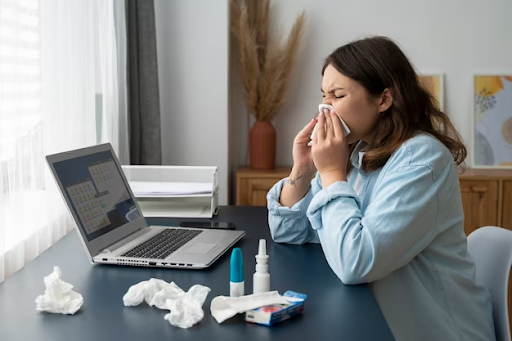
Why Do Allergies Worsen at Night?
Allergies can be incredibly frustrating and disruptive, particularly when symptoms worsen at night. Many people with allergies find themselves struggling to breathe, experiencing restless nights, and getting inadequate sleep due to these intensified symptoms. But why do allergies typically get worse at night? In this blog, we’ll explore the main reasons behind nighttime allergy flare-ups and discuss proactive measures to manage your allergies effectively, ensuring better sleep quality.
Reasons Why Allergies Can Worsen at Night
Understanding why allergies worsen at night is crucial for managing symptoms and improving sleep quality. Here are the key factors contributing to nighttime allergy flare-ups:
Increased Exposure to Allergens
One primary reason allergies worsen at night is increased exposure to allergens. Spending extended periods in bed exposes you to common household allergens such as dust mites, pet dander, and mold spores. These microscopic particles can accumulate on bedding, carpets, and other surfaces, leading to heightened allergy symptoms as you breathe them in throughout the night.
Biological Factors
Circadian rhythms and hormonal changes also significantly influence nighttime allergy flare-ups. In the evening, the production of certain hormones, including cortisol, decreases. Cortisol, a natural anti-inflammatory, helps regulate inflammation in the body. Lower cortisol levels at night can increase inflammation and allergy symptoms. Additionally, the body’s natural circadian rhythm can influence the release of histamine, a chemical involved in allergic reactions, further aggravating symptoms at night.
Environmental Factors
Environmental changes like temperature, humidity, and air quality can also contribute to nighttime allergies. Pollen and other airborne allergens can become more concentrated indoors as temperatures drop in the evening. Fluctuations in humidity can create a favorable environment for dust mites and mold growth. Moreover, reduced nighttime ventilation can trap allergens indoors, leading to poorer indoor air quality and increased allergen exposure.

Tips to Alleviate Nighttime Allergy Symptoms
For many allergy sufferers, nighttime can be particularly challenging, resulting in poor sleep and overall health issues. Thankfully, several strategies can help reduce allergy symptoms and promote better sleep at night:
Bedroom Allergen Control
Implementing allergy control measures in your bedroom can significantly reduce exposure to allergens. At Frontier Allergy, we recommend using anti-allergic mattresses and pillow covers to create a barrier against dust mites and other allergens. Regularly vacuum and clean surfaces to remove accumulated allergens. If you are allergic to pet dander, keeping pets out of the bedroom is best to minimize exposure.
Lifestyle Adjustments
Even minor lifestyle changes can make a big difference. Showering before bed can help remove allergens from your skin and hair, preventing them from transferring to your bedding. Using an air purifier or humidifier recommended by Frontier Allergy can improve indoor air quality and maintain optimal humidity levels, reducing allergen exposure. Elevating your head while sleeping can help alleviate common allergy symptoms such as post-nasal drip and nasal congestion.
Medication and Treatment Options
Frontier Allergy offers various medication and treatment options to manage nighttime allergy symptoms effectively. Over-the-counter and prescription medications like antihistamines can block the effects of histamine, reducing symptoms such as a runny nose, itching, and sneezing. Decongestants relieve nasal congestion, while sprays target specific nasal symptoms. We provide immunotherapy options for long-term management, including allergy shots or drops, which gradually desensitize your immune system to particular allergens, reducing the severity of reactions over time.
When to Seek Professional Help?
Efficient management and relief of allergy symptoms often require knowing when to seek professional help. While over-the-counter medications can help manage mild symptoms, some situations may necessitate professional intervention:
Interference with Daily Life
If nighttime allergies significantly impair your sleep quality, affecting your daily activities and productivity, it is crucial to consult an allergist at Frontier Allergy. Chronic fatigue, difficulty concentrating, and reduced productivity due to poor sleep can severely impact your overall well-being. Professional diagnosis and treatment can help restore a high quality of life and prevent complications from prolonged allergy symptoms.
Severe Symptoms
Do not ignore severe allergy symptoms, especially those indicating a potentially life-threatening reaction such as anaphylaxis. Symptoms such as wheezing, throat swelling, or difficulty breathing require immediate medical attention. Anaphylaxis is a severe condition that needs prompt treatment with epinephrine and further medical care. If you experience these symptoms, seek medical help immediately.
No Relief from OTC Medications
Over-the-counter antihistamines, decongestants, or nasal sprays may temporarily relieve mild allergy symptoms. However, a professional evaluation is necessary if persistent or severe symptoms persist and do not improve with these medications.
In such situations, talking to an allergist at Frontier Allergy can be helpful as they can pinpoint the exact allergens causing your symptoms and suggest appropriate, individualized treatment plans. Our allergists can also provide bespoke therapies such as immunotherapy (allergy shots or drops) for the long-term management of allergies.

Frontier Allergy: A Team of Board-Certified Allergists!
Our staff at Frontier Allergy are experts in offering personalized treatment for various allergy conditions, such as food allergies, seasonal allergies, and asthma. With a wealth of knowledge and a dedication to fostering positive patient relationships, they can help you determine your triggers, efficiently manage your symptoms, and enhance your quality of life.
Don’t let allergies that wake you up at night disrupt your daily schedule and sleep. Use the advice provided to get control of your allergy symptoms and seek a professional when necessary. With the right strategy, you can get the rest you deserve, breathe more efficiently, and sleep better.
Contact us now to get the best possible care for yourself!

Written/Reviewed by: Dr. Neha Reshamwala
NPI number: 1780874578
Page last reviewed: 02/25/2025


 All blog posts
All blog posts




